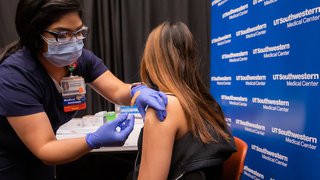COVID-19 baby bust: Pandemic expected to lower birth rates in 2021
December 15, 2020

When the world began locking down last spring due to COVID-19, people made jokes that there would be a 2021 baby boom because everyone was stuck at home. There’s only so much Netflix you can watch, right?
It’s been about 10 months since then, and it’s looking more likely that 2021 might be a "baby bust" instead. The birth rate in the U.S. has been declining for years, with the 3.75 million babies born in 2019 the lowest number since 1985. In Texas, the number of births dropped to 377,397 in 2019 from 378,624 in 2018.
A report from the Brookings Institution estimated that as many as 500,000 fewer babies might be born in 2021 – a 13% drop from 2019. That research was based on lessons drawn from economic studies of fertility behavior and data from the 2008 recession and the 1918 Spanish Flu.
In May, a survey of 2,000 women found that 34% wanted to delay pregnancy or have fewer children because of the pandemic. We won’t know just how much COVID-19 has affected the birth rate for another couple years, but we can say that we’ve seen fewer pregnant women at UT Southwestern in the second half of this year.
What we do know is would-be mothers have a host of COVID-19 concerns – about physical and mental health as well as financial well-being. Ultimately, the decision to get pregnant is a personal one, and factors other than just wanting a baby often affect that decision.
Related reading: Is it safe to get pregnant during the COVID-19 pandemic?
Physical health concerns
Women are rightly worried about their family’s health right now, particularly as flu season gains steam. The good news is that, thus far, not all pregnant women appear to be at increased risk for severe COVID-19 complications, and maternal infections do not appear to cause fetal complications similar to Zika infection.
Some patients may feel leery of taking one of the forthcoming COVID-19 vaccines. Pregnant women were not included in the vaccine clinical trials, so there is no significant data as to the safety and efficacy of the COVID-19 vaccine in pregnancy yet. But we do know that vaccines against other respiratory diseases, such as influenza and whooping cough, have proven safe and effective for patients who are pregnant and breastfeeding. Those vaccinations even offer some protective benefits for newborns until they are old enough to be vaccinated themselves.
We recommend that patients have a personal conversation with their doctor about whether vaccination is recommended for them.
Mental health concerns
It’s normal to worry during pregnancy, but while 29% of pregnant women reported having anxiety prior to the pandemic, a staggering 72% are dealing with it during the pandemic.
There are safe, effective treatments to manage anxiety before, during, and after pregnancy. Your Ob/Gyn can help you connect with a mental health expert so you can have a healthier, less stressful pregnancy.
COVID-19 vaccines: The tough questions answered by a frontline doctor
- Sonja Bartolome, M.D.
May 19, 2021
Age concerns
For women whose "biological clocks" were already ticking, 2020 may have been even more frustrating – especially those who have started or were planning to start assisted reproductive therapy such as in vitro fertilization.
In the U.S., the average age of first-time pregnancy increased from age 24.9 in 2006 to 26.9 in 2018, according to the Centers for Disease Control and Prevention (CDC). Most women can have safe, healthy pregnancies in their 30s and 40s.
If you are concerned, talk with your Ob/Gyn provider or a reproductive health expert. They can help you optimize your health for pregnancy and manage subfertility or infertility issues through safe, effective treatments.
Economic concerns
Raising children isn't cheap, and financial uncertainty may give women pause when deciding whether to have a baby. Many patients and families have experienced lost wages or job insecurity. Those who started new jobs during the pandemic may not have enough tenure to qualify for leave under the Family and Medical Leave Act (FMLA).
Childcare may also be tricky during the pandemic. New parents who are working from home must decide if they can care for a newborn at the same time. Otherwise, they'll need to find an outside or in-home childcare provider.
What to do if you want to get pregnant
If you are trying to conceive or are pregnant, you’ll want to be extra diligent about COVID-19 prevention. Wash your hands regularly, avoid large crowds, keep at least six feet between you and others, and wear a mask in public.
Make an appointment with your Ob/Gyn to discuss your fertility and help optimize your health for pregnancy. Keep all your well-woman, prenatal, and postpartum visits to stay on top of potential concerns. And when you come in for appointments, know that UT Southwestern is taking extra precautions to keep you and your baby safe.
Related reading: New and expecting moms: Don’t skip these health visits during the pandemic
If you decide that now is not the time to have a baby, talk to your Ob/Gyn about your birth control options, including how they may affect how fast your fertility returns when you do decide it’s time to try getting pregnant. Whether you choose to try for a baby in the new year or wait, we’ll be here to help you stay safe and healthy.
To visit with an Ob/Gyn, call 214-645-8300 or request an appointment online.












